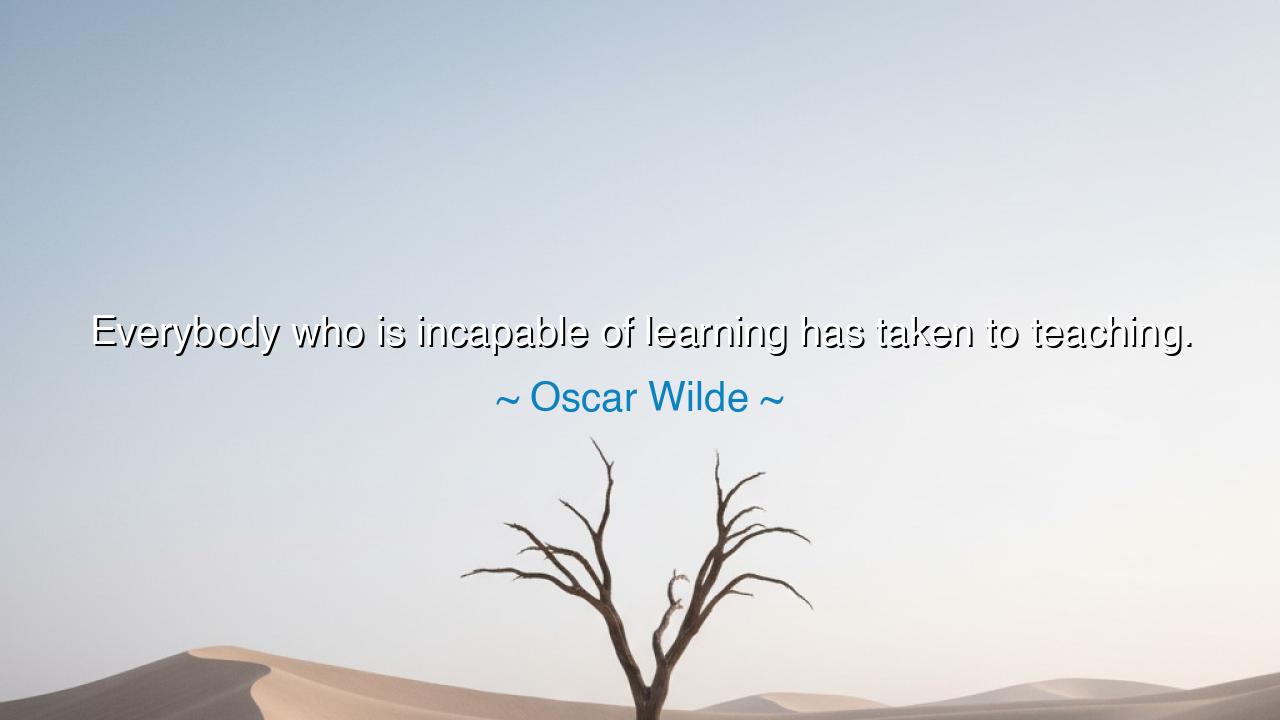
Everybody who is incapable of learning has taken to teaching.






“Everybody who is incapable of learning has taken to teaching.” — thus spoke Oscar Wilde, the poet of paradox and the philosopher of irony, whose wit concealed wisdom like a sword sheathed in laughter. At first, his words seem harsh — a jest aimed at those who teach without humility. Yet beneath their sting lies a profound truth: that true teaching begins with the willingness to learn, and that those who have closed their minds to growth often seek refuge in instructing others. Wilde, ever the critic of vanity and pretension, saw that many who claim to guide others have themselves ceased to walk the path of discovery.
In this statement, Wilde exposes a flaw that stretches across generations — the arrogance of those who believe they have already arrived at wisdom. To be incapable of learning is not a matter of ignorance, but of pride. It is the condition of a soul that has shut its doors to new ideas, that values authority over understanding, and repetition over revelation. Such a teacher may hold a title, but not the spirit of a learner. For learning is an act of humility — it requires one to admit not knowing, to question, to listen, to evolve. The one who stops learning has ceased to grow, and what does not grow begins to decay.
The origin of Wilde’s insight lies in his keen observation of the intellectual world of his time — a world filled with self-proclaimed authorities who taught from ego rather than experience. He saw how rigid systems of education often replaced curiosity with conformity. Many who stood before students spoke not from understanding, but from the dull comfort of memorized truths. Wilde’s biting humor cuts through this pretense: he mocks not the noble teacher, but the false teacher — the one who instructs without wonder, who dictates without discovery, who speaks much but listens little.
In contrast, the greatest teachers in history were always eternal students. Socrates, the father of philosophy, never claimed to know; he began every lesson by questioning. “I know that I know nothing,” he said — and through this humility, he became one of the wisest men who ever lived. His teaching was not the imposition of knowledge, but the awakening of thought. Likewise, Confucius, the sage of the East, declared, “When I walk along with two others, they may serve me as my teachers.” Both men understood that learning and teaching are not opposites — they are one and the same, each feeding the other like flame and fuel.
But Wilde’s warning remains: when a teacher ceases to learn, the light fades. History, too, bears witness to this truth. In the Middle Ages, many scholars clung to dogma so tightly that progress was strangled; they taught not to enlighten but to defend tradition. The great scientist Galileo Galilei faced condemnation from such men — teachers who refused to learn, who feared truth more than error. Yet Galileo, still a student of the heavens, dared to look through his telescope and learn anew. His courage to learn became his defiance, and through his willingness to be a student of the stars, he became a true teacher to all humankind.
Thus, Wilde’s words are not meant to mock all teachers, but to remind them of their sacred duty: to remain students forever. For the teacher who continues to learn becomes a bridge — carrying wisdom from the past into the dawn of the future. But the one who ceases to learn becomes a wall, blocking the flow of understanding. Teaching, when done without curiosity, becomes tyranny of the mind; but when done with humility, it becomes the greatest act of service.
Therefore, my children, if ever you are called to teach — whether in classrooms, in homes, or in life itself — do not cease to learn. Let every question humble you. Let every mistake instruct you. Listen as much as you speak, and seek wisdom even in the simplest of voices. Beware of the pride that says, “I know enough,” for that is the death of knowledge. The wise know that truth is infinite, and learning is eternal.
Remember, then, the paradox of Wilde’s wit: those who stop learning cannot truly teach. The best teacher is not the one who knows all answers, but the one who continues to ask the deepest questions. Keep your mind open as the sky and your heart as receptive as the earth. For in the dance between learning and teaching lies the music of wisdom — the song that has carried humanity forward since the dawn of thought itself.






AAdministratorAdministrator
Welcome, honored guests. Please leave a comment, we will respond soon